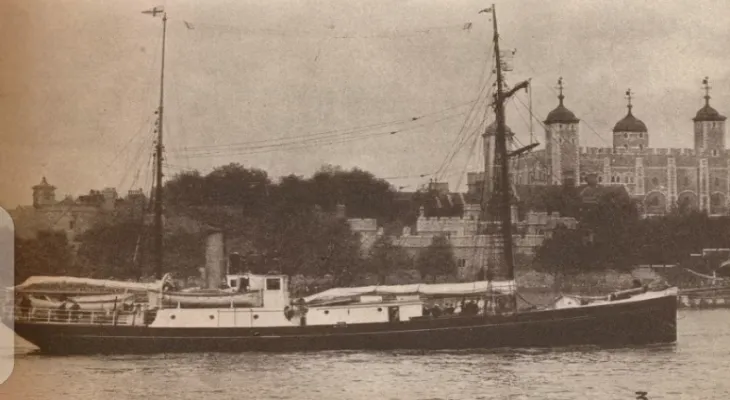Search here
Newspaper
Search here

Arab Canada News
News

Published: June 16, 2024
The Royal Canadian Geographical Society announced that shipwreck hunters have found the vessel "Quest," which was commanded by the famous Antarctic explorer Ernest Shackleton, largely intact on the ocean floor, about 15 nautical miles off the coast of Canada.
Shackleton was aboard the famous exploration ship when he died of a heart attack in January 1922.
Experts say that the Quest not only holds the history of its voyages but also likely contains artifacts gathered during its exploratory trips that continued until 1962, when the ship sank.
In a press release, John Geiger, the expedition leader and CEO of the society, stated that "the discovery of (the ship) Quest marks one of the final chapters in the extraordinary story of Sir Ernest Shackleton."
He continued, "Shackleton was known for his bravery and skill as a leader in times of crisis. The tragic irony is that this was the only death that occurred on any of the ships under his direct command."
A team of international experts identified the location of Quest using sonar equipment on June 9 after a 17-hour search covering about 24 nautical miles. David Mearns, a marine scientist and oceanographer who led the research, said at a press conference held by the society on Wednesday that before discovering the ship, the team had conducted months of research and analysis to determine the best area to search for the wreck.
Shackleton was on his fourth expedition to Antarctica when he died at the age of 47 while the ship was moored at South Georgia in the South Atlantic. The famous polar explorer was buried there, and the ship and its crew continued in an attempt to complete what is known as the Shackleton-Roosevelt mission. However, thick ice made it difficult to complete the journey, and Quest returned to Cape Town, South Africa, according to the Natural History Museum in London.
Essentially, Shackleton intended to use Quest for an exploratory voyage to the Canadian Arctic but was unable to procure approval from the Prime Minister of Canada at that time.
His death marked the end of what is known as the "Heroic Age" of Antarctic exploration. But the Quest's journey did not end there.
After selling the ship to a Norwegian company, several more exploratory trips were organized before it ended up as a seal hunting vessel. The ship Quest sank on May 5, 1962, after colliding with ice in the Labrador Sea off Canada, as stated in the press release. The crew was evacuated, and the known final location of the ship was determined, located 2.5 kilometers (about 1.6 miles) from where the expedition discovered it.
Geiger noted at the press conference that “the fact that Quest has now been found, almost in the waters Shackleton would have passed through had he succeeded in realizing his dream of a Canadian Arctic expedition, seems somewhat fitting that its end is here.”
Mearns mentioned at the press conference that the ship sank stern-first due to its heavy engine and is now upright at a depth of 390 meters (1,280 feet) below the ocean surface. He expressed the team's excitement "for the second phase of the expedition, which involves imaging and visually documenting the wreck and artifacts."
Mearns indicated that the society hopes to return to the wreck for the second phase of the expedition with an ROV, or remotely operated vehicle, later this year.
Shackleton's Legacy
In 2022, shipwreck hunters found the Endurance, a ship from one of Shackleton's previous expeditions, in Antarctic waters, at a depth of over 3,000 meters (about 9,843 feet) below the surface.
The Endurance sank in 1915 during Shackleton's attempt for the first overland crossing of Antarctica, after the ship was trapped by thick ice in the Weddell Sea near the far north of the Antarctic continent.
The society reported that the crew used lifeboats to reach a nearby uninhabited island known as Elephant Island, but Shackleton's quick thinking and bravery led all of them off the island after four months when he and a few men took a lifeboat for 1,287 kilometers (695 nautical miles) across the ocean to find help in South Georgia. All 27 crew members survived.
Nancy Cohen, a historian and professor of business administration at Harvard Business School who studied Shackleton's path, said, "Any serious reminder of the leadership of Ernest Shackleton is really a good thing in today's world. He's just an excellent example of a leader who made himself and his team capable of making the impossible possible."
Cohen pointed out that it is worth noting that only a few men on the Quest expedition were also on the Endurance voyage, which turned into a survival mission.
She concluded that "anytime the world reads more about Ernest Shackleton, we feel more inspired, strive harder to achieve our goals, and become a little better at trying to make ourselves good leaders."
Comments